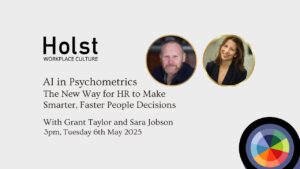People are complex. Seldom is an individual all 'bad'. Most are inherently reasonable people, who either get into a rut of poor behaviour or cope badly with extreme pressure. Fortunately, anyone can improve with self-awareness and emotional regulation.

Hot on the heels of number ten departures last week, it was the turn of the Home Secretary Priti Patel to face accusations of poor behaviour in the workplace. She immediately claimed to be unaware of the impact of her behaviour and expressed contrition for any damage caused.
While bullying or aggressive behaviour should never be condoned, is it too easy to blame the individual under extreme pressure? Do we expect them to be superhuman and self aware all of the time, especially if there is no structure in place to show that individual when they have gone too far?
When the stakes are super-high, we expect leaders to perform to an incredible level, with incredible integrity. We expect extreme results (not average) but then blame that person for behaving in an extreme manner. Without intervention, the cycle of extreme pressure and extreme behaviour isn’t broken and the results explosive.
In a workplace setting, it is the responsibility of the organisation to help that leader regulate and be aware of their actions. If the organisation expects results, it must be prepared to put a structure in place to deal with the inevitable undesirable side-effects.
We’re not here to judge Priti Patel. There are multiple sides to every story and each side will have their ‘own truth’. Many of us have experiences of workplace aggression from team leaders and senior leaders. Yet it is often brushed under the carpet by those at the top who don’t know how to tackle it while those on the receiving end succumb to burn out or simply leave. People leave managers, not organisations.
Leading with self-awareness and self-regulation
So if we all have our Mr Hyde moments, how do we encourage our Dr Jekyll to stay in control? In Chimp Paradox terms, Prof. Steve Peters would describe this as helping our Human to remain in control and responsible for our Chimp.
It comes down to self-awareness and self-regulation. Especially for those who have power over others. Priti Patel maintains that she did not know her responses caused damage. However, with better self awareness she would be able to recognise when her personal Hyde/Chimp was about to take over, and employ strategies to regulate or control it when under extreme pressure.
We’ve heard from people who claim that they do not recognise her from some of the descriptions given by her accusers. But perhaps they see her in day-to-day Jekyll/Human mode – rational, calm, pleasant – rather than when under pressure. This is common. Who we are in a high-stakes workplace, is not always who we are among family, friends and our wider professional network. This difference is not always conscious or intentional, but it does have to be recognised, accepted and actively managed by the individual.
Helping people to be more self aware and regulate is possible with assessment, training and crucially, coaching. This should never be about blame, rather it is about holding up a mirror and inviting the individual to reflect and accept the support they need to improve their emotional intelligence skills.
Do leaders even need to be assertive?
Of course they do! We all need to be assertive, whether in a leadership role or not. We all need to be able to constructively hold each other to account. But there are degrees of assertiveness. Too much, or over-use, becomes tyrannical. Too little, or under-use, is ineffectual. The goal is to get into the ‘flow zone’ where the balance is right and proportional to the situation.
‘Nice guys finish last!’, we hear you cry (actually, hopefully not). In his new book The Art of Fairness, author David Bodanis argues the case for the power of decency in a world turned mean. He cites the case of Danny Boyle, chief architect of the London 2012 opening ceremony. When asked how he proposed to stop 10,000 people from leaking the secret plans, his response was “let’s just ask nicely”.
Genius. His assertiveness here was right there in the flow zone, calm, rational and clear. Most people are reasonable and compliant when the request makes sense and is respectfully delivered, as it was in this case.
Bodanis asks, can you succeed without being a terrible person? Do bullies always win, must nice guys and gals finish last? We’d also pose the question that perhaps we mistake the over-use of resilience for motivation and commitment? He gives plenty of examples that prove decency and fairness (regard for others) are very much part of the make-up of a successful leader – that we can succeed without losing our souls. He draws out three particular characteristics for successful leadership that we whole-heartedly agree with:
- Listening without ego
- Giving in a way that builds trust
- Defending without vilifying
With greater emotional intelligence and proportionate resilience, any individual can work towards and achieve these characteristics. The first step is to accept that they can do better, make a personal commitment to and take control of their own development.
Use flowprofiler® and McQuaig to develop a healthy workplace culture
Develop emotional intelligence, resilience, motivation and with flowprofiler® to help your people manage pressure and form strong team relationships at work. With a keen focus on positive psychology, flowprofiler® uniquely measures resilience, motivation and emotional intelligence across two states: day-to-day and under pressure. The result is rich diagnostic information, easy to understand feedback and meaningful professional development.
Understand how your people are behaving differently and what you can do to support them with McQuaig. The McQuaig tools measure the traits needed for success in any role. It looks at how a person prefers to behave naturally and compares this with how a person is behaving in their current job. The analysis between the two shows any adjustments the individual is making and whether they are showing signs of high or low morale.
Contact us
Get in touch to find out how flowprofiler® and McQuaig could be the game-changer your organisation needs to thrive through and beyond the current crisis.
flowprofiler® and associated marks are registered trademarks of Chalmers International Limited | All rights reserved
eqflow® and associated marks are registered trademarks of Chalmers International Limited | All rights reserved
resilienceflow® and associated marks are registered trademarks of Chalmers International Limited | All rights reserved
motivationflow® and associated marks are registered trademarks of Chalmers International Limited | All rights reserved





